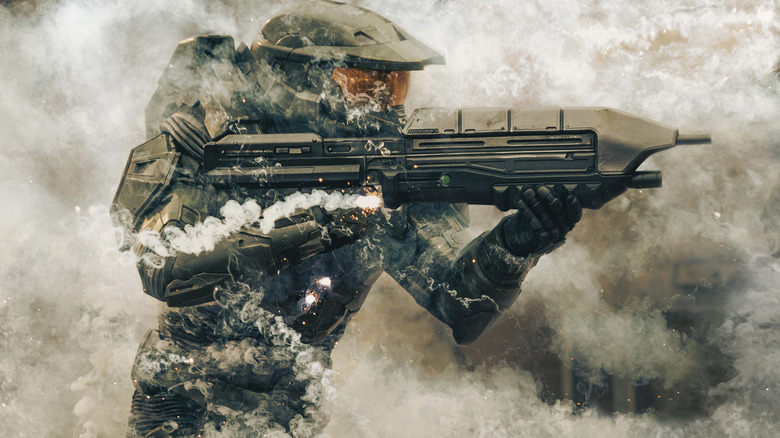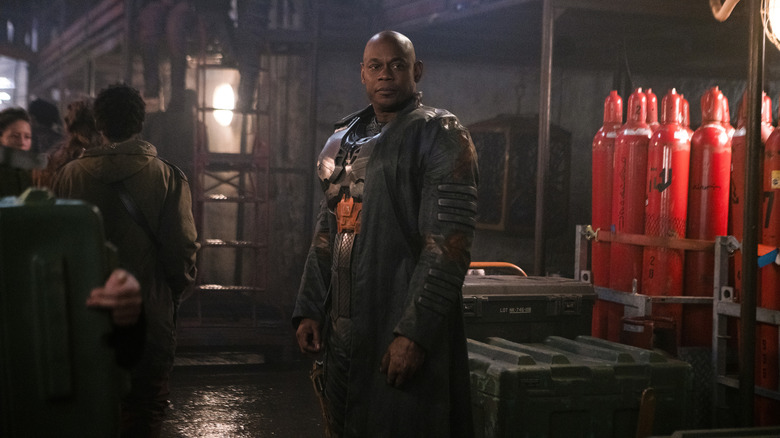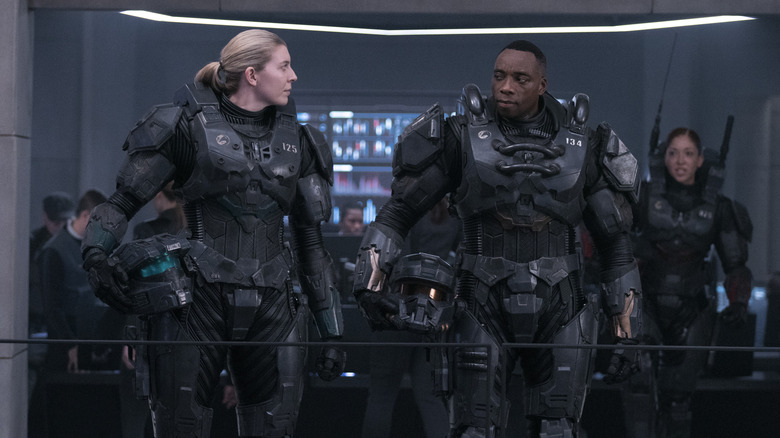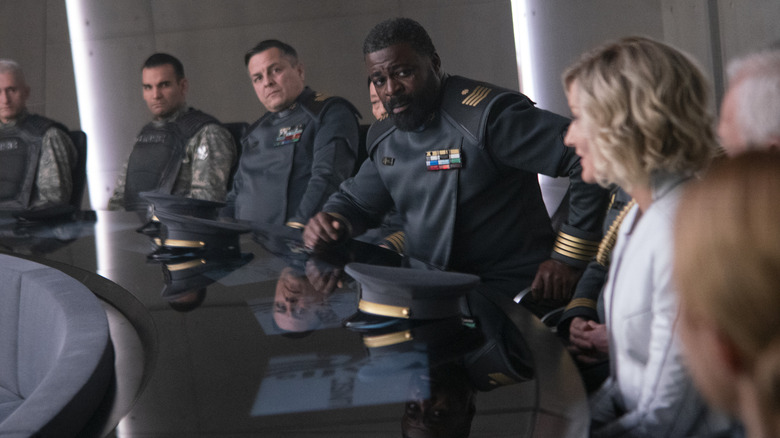Halo Dives Into The Master Chief's Past With A Wheel-Spinning Second Episode
In a lot of ways, second episodes can be even tougher to pull off than series premieres. The sheer amount of introductions, backstory, world-building, and tone-setting that all need to be established in such a short amount of time can easily command the majority of the creative team's attention and help paper over any potential misgivings. Generally speaking, viewers may be more inclined to be forgiving and willing to see the potential through the flaws the first time around. The next hour, however, has the burden of taking all of that set-up and moving the plot forward in a propulsive way, convincing those still on the fence to actually feel confident that the overall story is actually worth following in the long-term.
So in that light, episode 2 of "Halo" could be interpreted as a potential make-or-break moment for the series in the long term. Will the tease of a bold new status quo established at the end of last week's premiere, with the Master Chief and Kwan on the run from the UNSC, carry through the rest of the series? Can the writing team justify heading out onto unmapped territory and prove that this original story is worth the carefully calculated divergences from established lore? Will viewers ever find it in their hearts to get over the apparently unforgivable sin of actually showing us that a living, breathing human being exists underneath the Spartan helmet?
All of those pressing concerns and more were answered in the latest episode of "Halo" ... although not entirely in the affirmative.
Spoilers for "Halo" episode 2 follow.
Arc of the Covenant
After "Contact" ended with Master Chief (Pablo Schreiber) and Kwan (Yerin Ha) blasting away from the UNSC and into the stars, looking ahead to an uncertain future, "Unbound" begins by taking viewers a couple of decades into the past. The early years of the Spartan program have only ever been briefly alluded to in the various games (as glimpsed in the "Halo 4" opening cutscene), leaving the nearly overwhelming amount of expanded universe novels to pick up the slack and fill in all the gaps regarding John 117's tragic and disturbing backstory. In the aftermath of the previous episode pointedly unmasking the Master Chief and implicitly promising to dig into the character's headspace, it feels only natural to follow up with a flashback 22 years prior to the events of "Halo."
We begin with a much younger and visibly scarred John-117 living in the Spartan training facility on Reach, on the cusp of making a tough and momentous choice that'll go on to reverberate throughout the years. Played by Logan Shearer (and thankfully not a de-aged Pablo Schreiber), we find out that John and fellow Spartan-in-training and friend Soren (Jude Cudjoe) had previously made plans to make a bold escape from the UNSC's clutches. "Not training, programming," as the young Soren astutely puts it. But when the time comes to either be in or out, that same programming proves far too ingrained in John. With only a scant five-minute head start, the disturbingly robotic John allows Soren — one arm mangled and disfigured from the side effects of Dr. Halsey's enhancement treatment for the eventual super-soldiers — to make his escape before alerting the entire base.
This prologue further underlines just how this Paramount+ series has positioned itself and, by extension, John and his fellow Spartans: less of a glorified depiction of war heroes with dark pasts conveniently unremarked-upon, and more as tragic figures who desperately need to regain the humanity that decades of brainwashing and killing have robbed them of. Anyone with even a passing familiarity with screenwriting basics could hazard a guess that this wouldn't exactly be the last we see of the character, and that obvious prediction comes true later on in the present-day storyline.
Soldiers and scars
As was the case with the series premiere, "Unbound" is written by co-showrunners Steven Kane and Kyle Killen and directed by Otto Bathurst, lending a sense of creative consistency behind the scenes of these two early installments. Unfortunately, this also leads to another episode that, when viewed in conjunction with last week's, can't help but share many of the same noticeable shortcomings.
Once returned to the present-day storyline, we quickly learn of Master Chief's destination: the Rubble. The asteroid belt settlement also happens to be the younger John and Soren's original destination. Now, decades later and with Soren (now played by Bokeem Woodbine) the leader of the Rubble, their divergent paths have once again crossed ... but with their roles essentially reversed. On a positive note, this reunion at least provides us the opportunity to weigh these two very different Spartans against each other and see one potential path that the Master Chief could take. Carefree (and with emphasis on the "free" part), Soren has been able to make his own decisions, choose his own life, and even make a new family with his wife Laera (Fiona O'Shaughnessy), compared to the strictly order-following John, who's only just made his first step towards regaining a sense of agency.
On the whole, however, this plot detour comes across as little more than wheel-spinning. The episode (edited by Dan Briceno) attempts to avoid this stagnation by crosscutting between more UNSC interdepartmental bickering and the Covenant carefully weighing their next steps in the face of losing the mysterious object from last week (now referred to as a "keystone"). Unfortunately, "Unbound" doesn't take nearly enough advantage of the rich, poignant, and conflict-riddled history between Soren and John to make this plotline feel worth it. Soren's actual grudge against the Chief feels oddly misaligned, focusing more on the amount of time John gave him to escape rather than his refusal to join him in the first place, but it doesn't help matters that John still remains so emotionally distant and repressed (though we learn that "pellets" are artificially repressing any sense of feeling, even taste).
Most disappointingly, however, this episode's contribution to the ongoing storyline feels negligible. We get some dramatic and fairly oblique teases about the eponymous Halo as Soren introduces John and Kwan to Reth, a crazed former captive of the Covenant (Johann Myers), but to what end? Ultimately, it comes at the cost of splitting up the one pairing that desperately needs more time devoted to it, while reverting the status quo back to Master Chief under UNSC control once more. Though perhaps John's lingering look at the smiley face stamp on his hand, courtesy of Soren's son, provides a hint of who he knows his real friends are.
We're only 2 weeks in, but with only 9 total episodes to work with, "Halo" needs to jump into gear soon.
(Re)claim to fame
Though relatively light on plot, this second episode of "Halo" provides plenty of opportunity for stray observations, shamelessly nerdy nitpicks, deep cut references pulled straight out of franchise canon, and at least a few interesting set-ups for the directions future episodes may take. For all that and more, join me down the rabbit hole as we break this latest episode down into even finer powder.
- Halo Watch: Another week, another Halo-less "Halo" episode. On the bright side, however, the sequence where John is forced to handle the Madrigal "relic" in that ramshackle prison on the Rubble finally forces our main characters to utter the word "Halo" for, I believe, the very first time. In between his babbling, the out-of-control Reth confirms that it's a weapon of some kind (what are the chances this show reenacts the "It's not a cudgel, you barbarian!" dialogue from the original game?), bringing us marginally closer to the series bothering to address its actual title. If I seem a little impatient about this, it's because I am!
- Aging Process: I touched on this earlier, but let's give another round of applause to the creatives for simply finding young actors to embody the roles of a younger John and Soren, rather than digitally de-aging Schreiber and Woodbine. And both of them, especially Logan Shearer as John, do fantastic jobs of portraying convincing versions of their respective counterparts. What a concept! Though they're admittedly much different circumstances, I anxiously await the day that fellow sci-fi franchise "Star Wars" learns that it can, in fact, take this route too.
- Barney Rubble ... Trouble: One of the more unexpected references to established "Halo" canon has to be the presence of the Rubble, the origins of which are found in the pages of the ancillary novel "Halo: The Cole Protocol" by author Tobias S. Buckell. The settlement is actually even more out-there in the book, serving as an uneasy home to both humans (mostly Insurrectionists) and a renegade band of Covenant Jackals alike. Even without that complicated detail, the depiction of the exotic locale is admirably stunning to watch in the episode itself, serving as a sort of riff on the "Star Wars" cantina and home to all of this galaxy's most wretched hive of scum and villainy. Also, the name "Reth" originally comes from a particularly ruthless Jackal in the story and was apparently repurposed for Johann Myers' character, a former Covenant prisoner of war. Someone on the "Halo" creative team is clearly a big fan of "The Cole Protocol."
- Soren's Sob Story: Speaking of "Halo" novels, those who've read the anthology book "Halo: Evolutions" already have a leg up on what Soren's whole deal is. In the short story "Pariah," Spartan candidate Soren suffers a severely debilitating disfigurement from Dr. Halsey's augmentation experiments and washes out of the program. The series loosely adapts this backstory, though it doesn't quite aim for the level of tragedy inherent in the character's book counterpart.
- Mind the Gap: Okay, look, this is such a meaningless thing to nitpick ... but in the 26th Century, people are still making casual "Mind the gap" jokes when boarding public transportation, huh?
- The Great Journey: I have to admit, the whole "Blessed One" plotline is still throwing me for a bit of a loop. Everything about how the Covenant reacts to Charlie Murphy's human character seems to imply she holds some special place of significance among the hierarchy, but the Prophets themselves seem to treat her like an irritating child. A little clarity (not the drug kind found on the Rubble, mind you) would be nice! Otherwise, we get to add "The Great Journey" to our terminology here. In the games, this refers to the Covenant's deluded belief that activating the Halo rings will bring about some religious ascendance into the "Great Beyond." I really hope the show sinks its teeth into this fascinating, fanatical lore.
- The Human Condition: The (non-Spartan) human side of the story still feels slow-going, though the continued condemnation of the UNSC almost makes it worthwhile. Here, they're shown installing a puppet leader (Burn Gorman's Vinsher Grath) on Madrigal, who turns out to be somewhat less controllable (and more murderous) than anticipated. But our grand circle of heroic UNSC leadership, Captain Keyes included, justifies it because, hey, he's keeping galactic fueling prices down!
- Cortana Controversy? I'm still in "Wait and see" mode here, but I can't imagine fans will react well to just how different Cortana's origins appear to be in this series. This goes way beyond her lack of blue. In the games and novels, she's introduced to the Master Chief very early on and bolsters her super-human host's enhancements even further. Here, episode 2 reveals she's been reimagined to "overwrite Spartan consciousness" and essentially replace John's entire sense of being, unambiguously positioning her as a Very Bad Idea with the show's final shot of the Halsey clone creepily coming to life. Meanwhile, the marketing is attempting to use her cutesy and lovable public image to sell the show, which certainly doesn't feel like tonal whiplash at all. I'm ... intrigued by all this!



